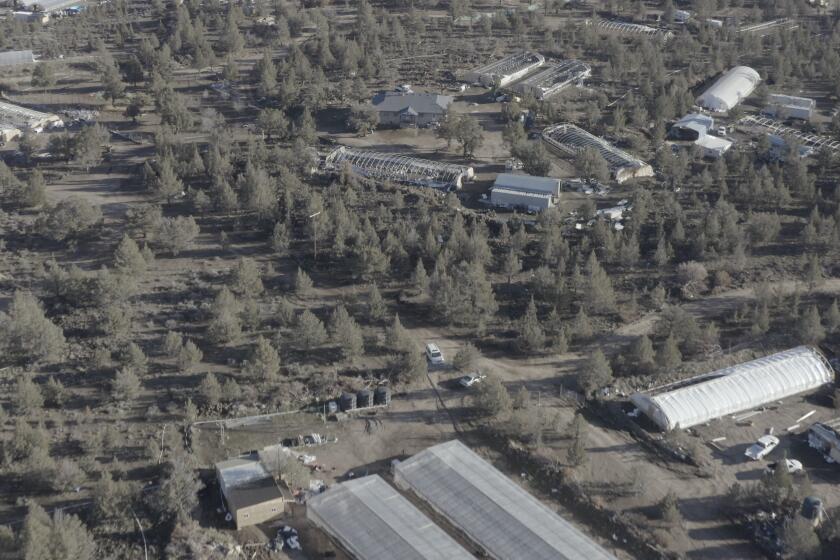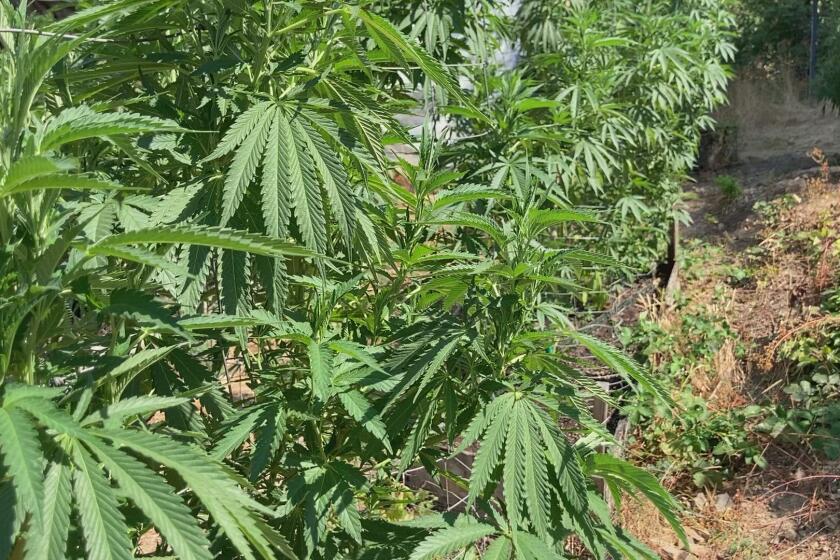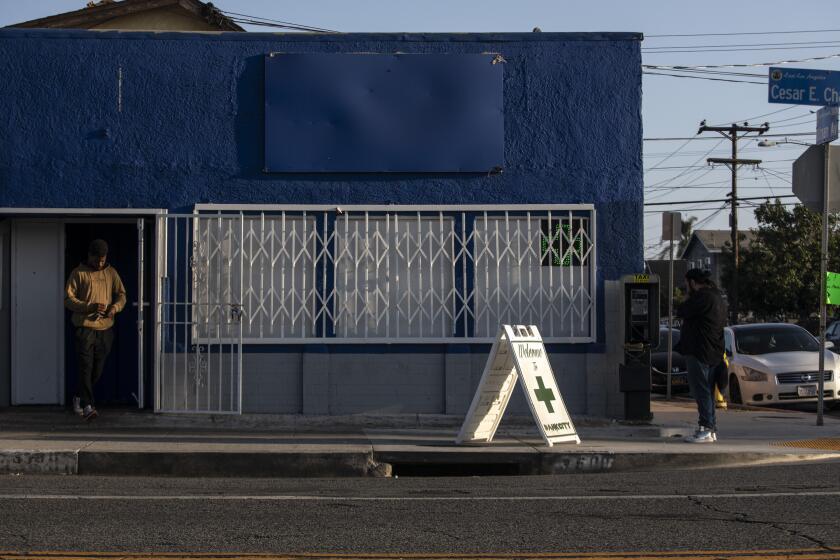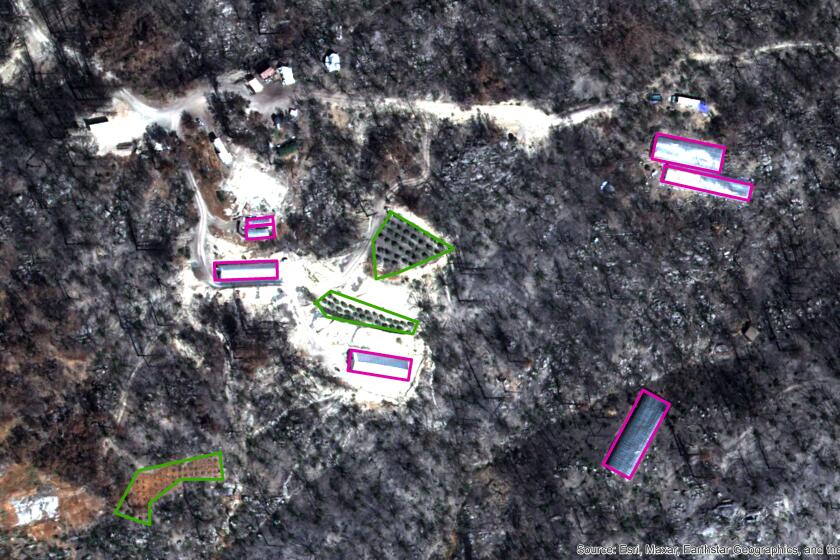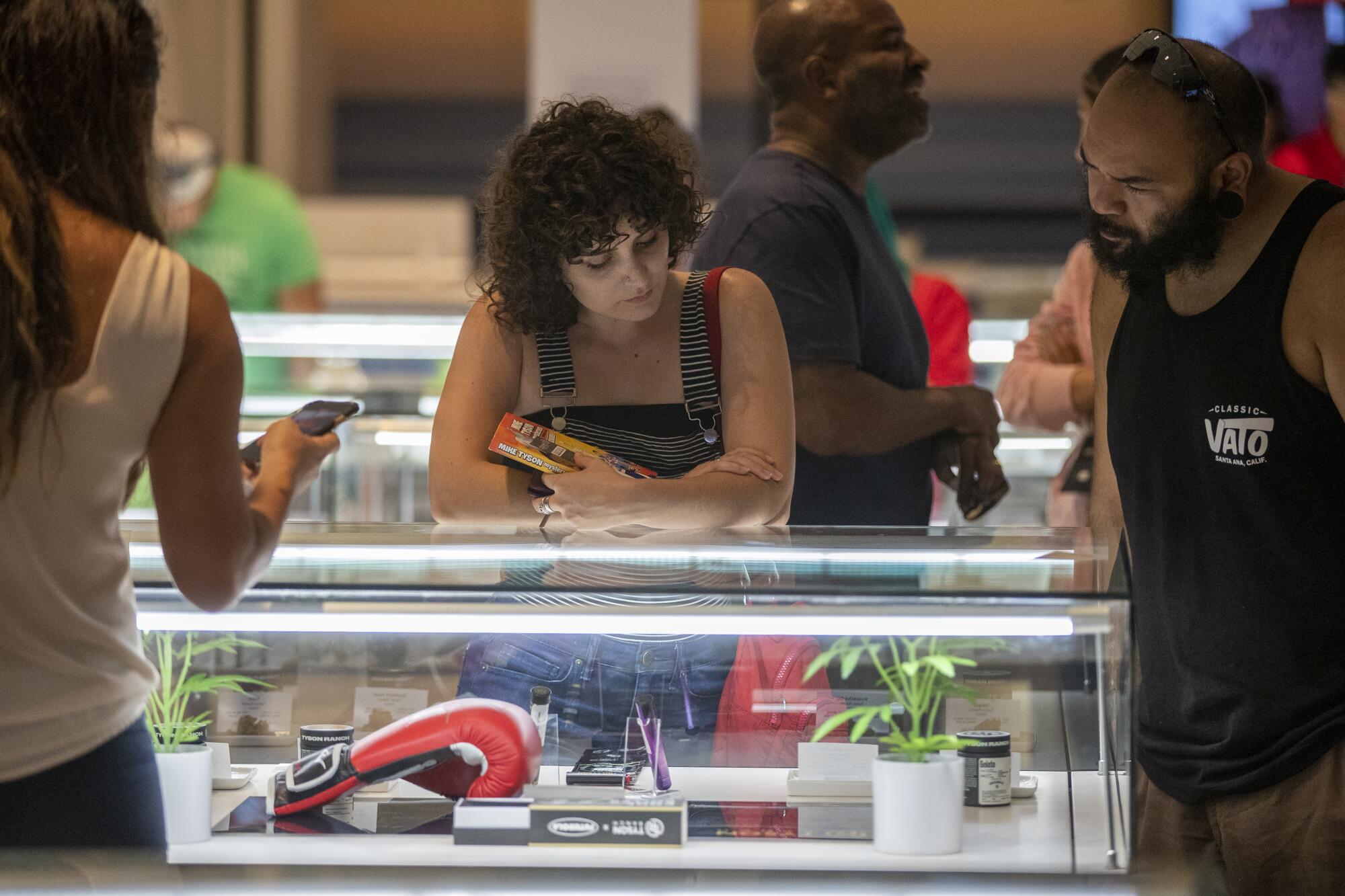
- Share via
SACRAMENTO — Architects of the effort to legalize pot in California made big promises to voters.
But six years later, California’s legal weed industry is in disarray with flawed policies, legal loopholes and stiff regulations hampering longtime growers and sellers. Despite expectations that it would become a model for the rest of the country, the state has instead provided a cautionary tale of lofty intentions and unkept promises.
Compromises made to win political support for Proposition 64, the 2016 initiative to legalize cannabis, along with decisions made after it was approved by voters that year, unleashed a litany of problems that have undermined the state-sanctioned market.
Illegal cannabis farms are engulfing parts of California and exploiting farmworkers who labor in squalid, deadly conditions, a Times investigation finds.
At the root of the failure: an array of ambitious, sometimes conflicting goals.
California officials vowed to help small farmers thrive but also depended on the support of big cannabis operators backed by venture capital funding, who helped proponents of Proposition 64 raise $25 million and won a key concession after its approval. The result was a licensed recreational cannabis system that benefited large companies over smaller growers who are now being squeezed out of the market.
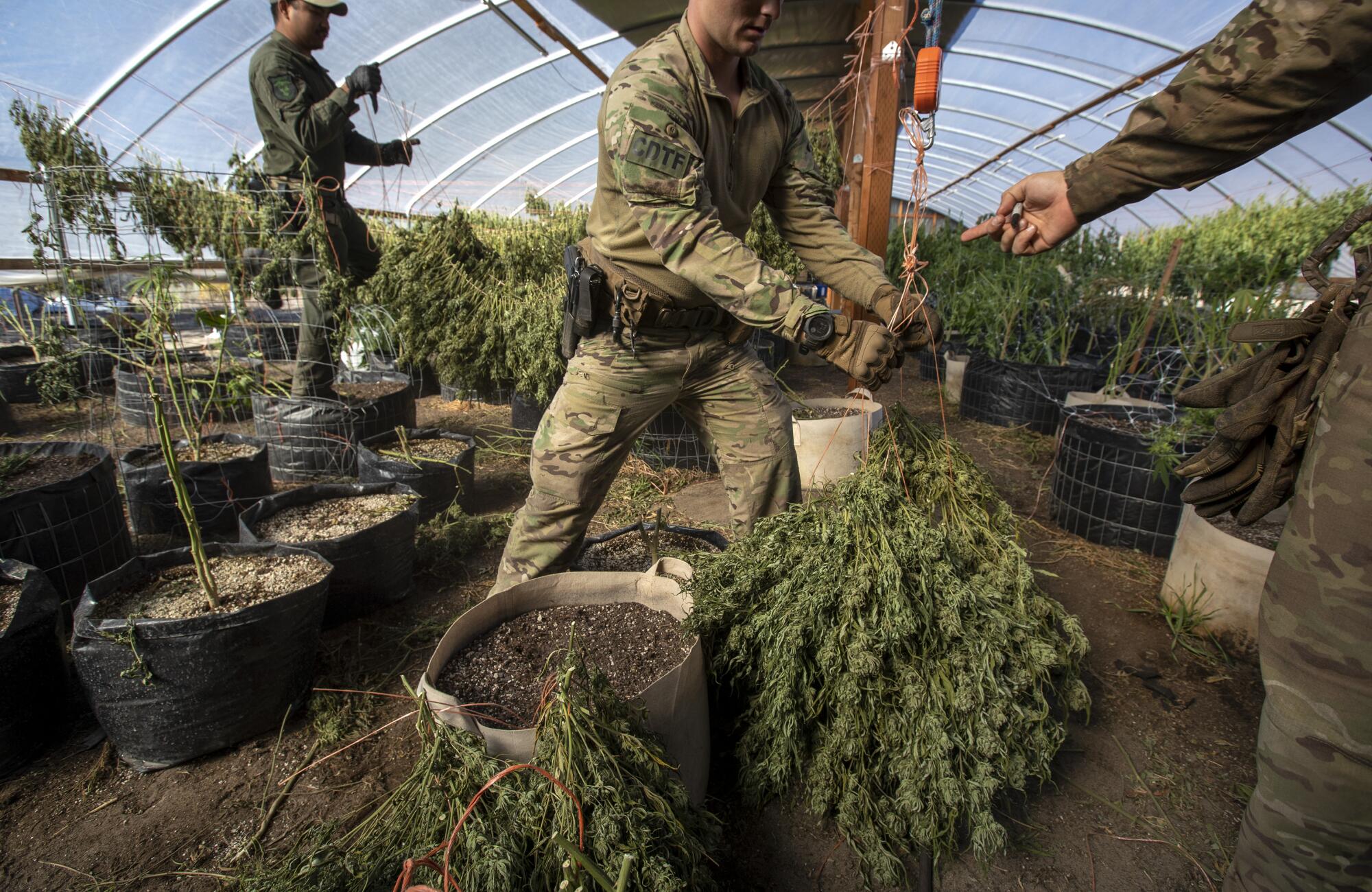
The state set out to simultaneously cripple illegal operators and reduce marijuana-related criminal penalties to address racial injustices imposed by the long-running “war on drugs.” Far from reducing illegal weed, those efforts instead allowed the black market to flourish after legalization with the help of organized crime operations that run massive unlicensed farms and storefront dispensaries in plain view, bringing crime and terrorizing nearby residents. And those raided by police are often up and running again within weeks or days.
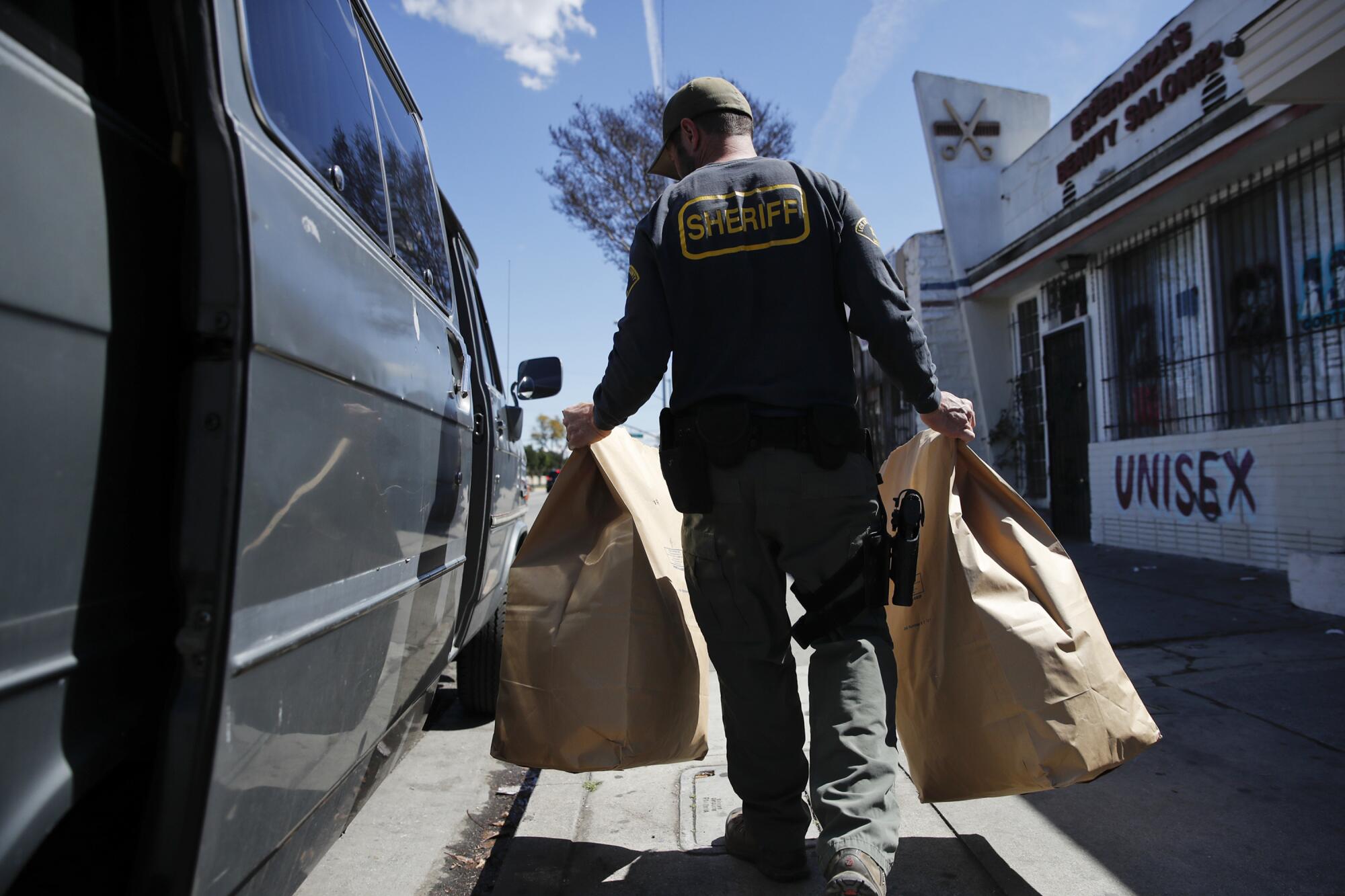
While making legal pot available across the state, officials created regulatory loopholes that allowed large swaths of California to ban marijuana sales. Though voters approved legalization, cities and counties have been skittish: Most rejected allowing cannabis businesses in their jurisdictions, resulting in only a fraction of the predicted number of licensed dispensaries operating.
A glut of cannabis produced by licensed and unlicensed farmers has driven down what small farmers can get for their crops, resulting in many facing financial ruin. Licensed businesses complain of stifling taxes and high overhead costs.
Many of the serious problems the state now faces were predicted seven years ago by a blue ribbon commission chaired by Gavin Newsom, then California’s lieutenant governor.

The commission urged restraint on taxing the legal market and limits on licensing to prevent big corporate interests from dominating the industry. The panel, which included law enforcement and civil liberties activists, also recommended robust enforcement, particularly against large illegal growing operations.
This is the story of how the promise of Proposition 64 went so wrong, and how the state’s grand vision proved so elusive.

It was a sweltering afternoon in 2015 when Newsom and other members of his blue ribbon commission faced hundreds of anxious cannabis growers and sellers inside the Redwood Playhouse, a small theater in Garberville.
The meeting was held a year before Californians would vote to legalize recreational cannabis, and pot farmers at the Humboldt County gathering gave the panel a preview of the potential problems to come.
Small-scale growers, including second-generation farmer Jonathan Baker, told Newsom they were worried about surviving under the state legalization plan.
“We just do not want to see our livelihoods stolen from us,” Baker said.
Newsom told the farmers that he was sympathetic to their plight and warned that deep-pocketed special interests were already at work in Sacramento.
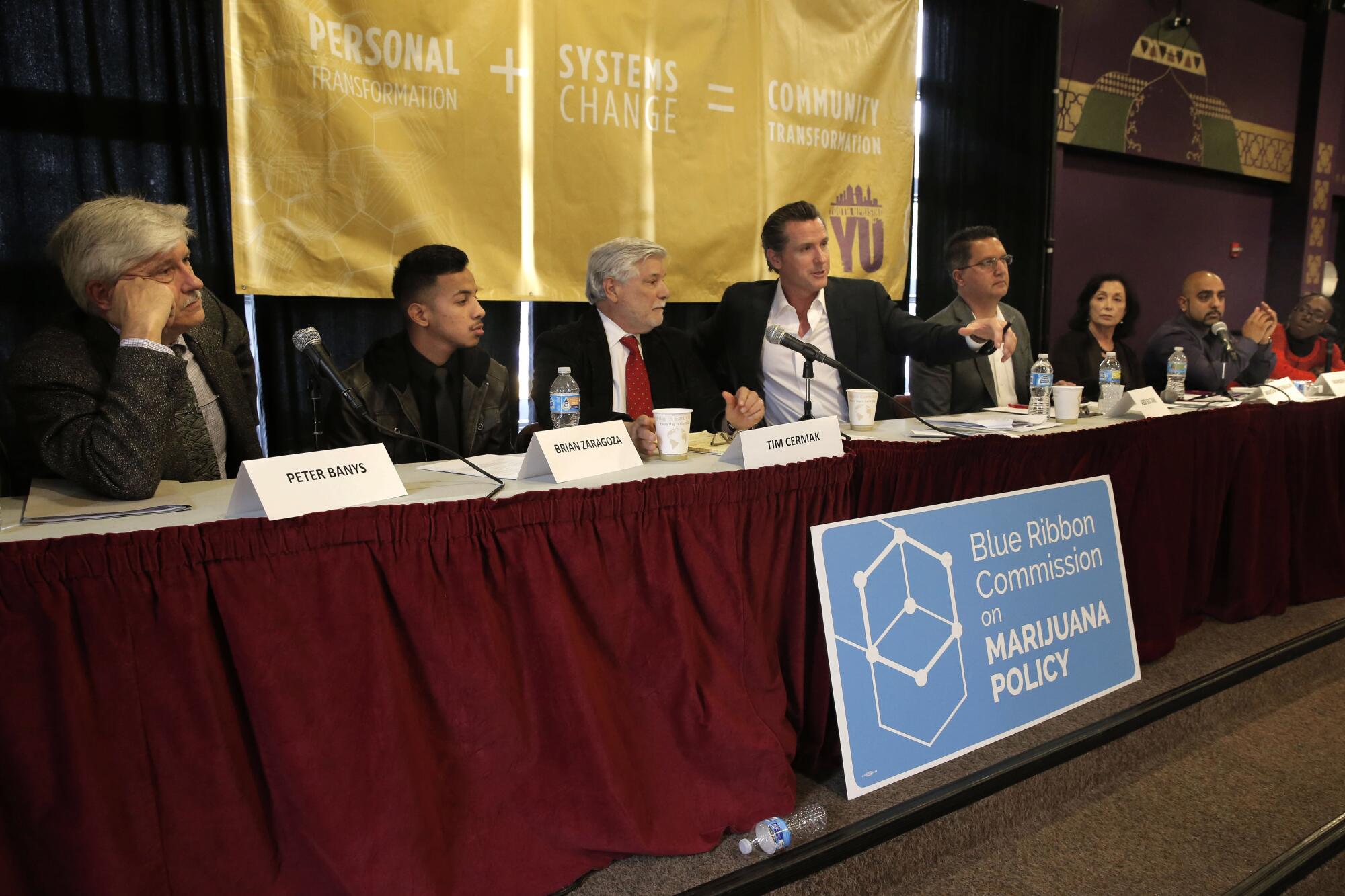
“I’m in Sacramento long enough to know that the persuasion industry moves it,” Newsom told the crowd. “Folks with a bunch of money move in, and they’re writing those rules and regulations and, with respect, writing a lot of you guys out. We cannot let that happen.”
His blue ribbon commission’s report released months later suggested drafters of a legalization initiative consider limiting the number of licenses issued to any one owner “to prevent the growth of a large, corporate marijuana industry dominated by a small number of players.”
Commercial cannabis resulted in corruption and questionable conduct that has rocked local governments across California, a Times investigation found.
State officials and backers of the initiative promised to limit farms to an acre apiece for five years to give small growers a chance to establish themselves in the legal market. As a result, Proposition 64 prohibits issuing a license for more than one acre until Jan. 1, 2023.
Once the ballot measure was approved by voters, it was up to state agencies to draft and implement the various rules that would regulate the new licensed market. It was during that process in 2017 that state agriculture bureaucrats added a last-minute loophole that allowed firms to accumulate multiple licenses if each was for less than an acre. As a result, large corporate farming operations have accumulated numerous licenses of under an acre each, putting small farms that are unable to compete at that volume out of business.
Today, the 10 companies with the largest growing operations have a combined 1,862 licenses, or 22% of the 8,338 state licenses for cultivation, according to a Times analysis of state data.
The loophole was added, after more than a month of public input, by administrators at the California Department of Food and Agriculture, drawing protests from state Sen. Mike McGuire (D-Healdsburg) and Assemblyman Jim Wood (D-Santa Rosa).
California’s legalization of recreational cannabis in 2016 ushered in a multibillion-dollar industry. But many of the promises of legalization have proved elusive.
“This last minute revision rolls out the red carpet for large corporations to crush the livelihood of small family farmers who should be given a fair chance to succeed in a regulated market,” the lawmakers wrote in a letter to the department.
A Newsom administration official noted the controversial rule on licenses was added before he was elected governor. The administration told The Times that agriculture officials believed they had no authority to limit the number of licenses under an acre that an individual could obtain.
Advocates for small growers reject that explanation. They say they felt left out of rule-making discussions, and believe lobbying by corporate cannabis interests was behind it.
“The law was written by and for big money,” said Casey O’Neill, a small-scale grower in Mendocino County who was active in an association of small farmers at the time the rules were written.
O’Neill and other small farmers point to a flood of campaign contributions from cannabis cultivators, retailers and others that includes a combined $400,000 to Newsom’s first campaign for governor, the most given by the industry to any of the candidates in the 2018 election.
One firm that now has a multi-acre farm, FLRish Inc., contributed $10,000 to the Proposition 64 campaign and spent $574,000 lobbying state agencies during the years regulations were drafted, approved and implemented. The firm has 23 cultivation licenses for a large farming operation in Monterey County.
The success of illegal cannabis shops and the struggles of legal ones in the heart of L.A.’s Eastside offer a stark illustration of how California’s legalization of marijuana has gone wrong.
People’s Farming LLC received state approval for 215 cultivation licenses, allowing it to grow more than 160 acres of cannabis on the outskirts of Lemoore in Kings County. A Times reporter who visited the site was turned away by a security guard and a company representative, who declined to answer questions about the operation. The firm’s top executive gave $7,500 to Newsom’s 2018 campaign for governor.
State cannabis department officials are not concerned that there are several large firms in addition to small operations, believing a diverse market is needed to meet consumer needs, said Linda Mumma Solorio, an agency spokeswoman.
She said the agency is trying to assist small farmers by providing financial help to cities that assist minority-owned businesses and by cracking down on growers who falsely claim to have grown their crops in areas known for high-quality weed.
Nicole Elliott, director of the California Department of Cannabis Control, acknowledged times remain tough for small farmers.

“I fear that we will lose some of them, whether they close up shop altogether or revert back into the illegal market,” she said in a recent interview with The Times. “That is an area the state can do more to help remove barriers for them to participate in the legal market.”
In Humboldt County alone, surveys conducted before Proposition 64 estimated that there were as many as 15,000 grow sites. As of June, there were 884 licensed cultivation operations, according to Natalynne DeLapp, executive director of the Humboldt County Growers Alliance.
Baker, the small farmer who warned Newsom of his fears about legalization’s impact on his livelihood, has struggled for years to get state and local permits to grow in California.
He said he has been stymied in part by the significant expense of meeting state and local requirements, which for him include bringing power and water facilities to a remote Humboldt County property.
Cannabis flooding the market from large grows has driven down prices and made it difficult for small farms to turn a profit, he said.
As a result, Baker stopped farming in California two years ago and began growing hemp in Oregon and Wisconsin.

California was once viewed as a cannabis trailblazer.
It was the first state in the nation to authorize the sale and use of medical cannabis by approving Proposition 215 in 1996. From that point, groups that included the Drug Policy Alliance began planning to expand legalization to recreational use.
Their first attempt, Proposition 19 in 2010, drew fierce opposition from leading city councils, police chiefs and prosecutors, including then-San Francisco Dist. Atty. Kamala Harris. Voters shot down the initiative by a margin of 53% to 46%.
But the rise of the criminal justice reform movement in the years that followed galvanized support for legalization. Proponents pointed to the disproportionately high marijuana-related arrest rates of people of color, particularly Black residents.
Newsom, who says he has never used the drug, was among early supporters who argued that legalization was a vital social justice issue. He agreed to head the Blue Ribbon Commission on Marijuana Policy to study the thorny issues California would face in legalizing cannabis.
At the hearings, representatives for cities and law enforcement told the commission that any legalization measure would have to guarantee municipalities could ban pot businesses.
Those drafting Proposition 64 took note: The ballot measure was written in a way that gave cities and counties the power to veto allowing cannabis businesses within their jurisdictions. Key opponents of Proposition 19, including the League of California Cities, did not oppose Proposition 64.
That concession shaped California’s legal weed market in ways that some supporters didn’t anticipate.
When pot became legal here, the vast majority of communities didn’t want anything to do with the drug.
Five years after the launch of legal pot, some two-thirds of California cities prohibit brick-and-mortar retail cannabis stores, according to Hirsh Jain, founder of the Ananda Strategy, a firm that advises the cannabis retail industry. Among Orange County’s 34 cities, for example, Stanton, Santa Ana and Costa Mesa are the only ones that have approved retail stores.
“For too many Californians, the promise of cannabis legalization remains out of reach,” Newsom said Sunday as he signed a package of bills that includes protections for the delivery of medical marijuana.
Instead of a predicted 6,000 cannabis retail stores, California has licensed only 1,200 pot shops and 597 home-delivery businesses, fewer than exist in some smaller states.
Advocates for legalization argue there are public health and safety benefits to cannabis shops operating across the state.
They note that in areas without licensed shops, residents are more likely to buy untested marijuana from illegal operations, which include those run by organized crime groups.
“Local control is a disaster [for] cannabis” in California, said Robert Solomon, a UC Irvine law professor and co-chair of the school’s Center for the Study of Cannabis.
California’s legalization of recreational cannabis in 2016 ushered in a multibillion-dollar industry estimated to be the largest legal weed market in the world. But many of the promises of legalization have proved elusive. In a series of occasional stories, we’ll explore the fallout of legal pot in California.
Proposition 64 was drafted by attorney Richard Miadich, a longtime political ally of Newsom, whom the governor later appointed as chairman of the state Fair Political Practices Commission. Miadich declined to comment on whether Proposition 64 achieved his aims.
Newsom said that from the start of legalization, there was a political imperative to take into consideration the concerns of cities in drafting the initiative, and he has urged those dissatisfied with the slow growth of the legal market to be patient.
In June, he responded to criticism from the industry by announcing reforms that included eliminating a cultivation tax to ease the burden on legal farms. He also approved $20 million in grants to cities and counties to develop and implement local retail licensing programs — an incentive aimed at encouraging more cities to embrace cannabis businesses.
“This will be a multiyear process to get that black market on the retreat, not the ascendancy, and get the retail and responsible adult-use market on steady ground,” Newsom said at the time.
Though legalization proponents say the measures are a start, many say stronger action is required by the state.
Sean Kiernan, executive director of the veterans advocacy group Weed for Warriors, has touted a proposal to also reduce the cannabis excise tax imposed on retailers from 15% to 5%, and share some of the revenue with counties and cities that allow pot shops.
Advocates for a broader market say California needs to look at other states for inspiration.
Cannabis retail stores are allowed in two-thirds of Washington’s towns and 79% of those in Oregon.
In Oregon, cities where a large portion of voters supported the state legalization measure must put any proposal to ban shops to a local vote. That has happened in towns including Oregon City, where the city commission adopted a prohibition but voters rejected the ban.
Oregon has one pot shop for every 5,500 residents. In California, there is one pot shop for every 36,000 residents.

Ken Corney was the police chief in Ventura when he was asked to serve on Newsom’s blue ribbon commission.
The plain-spoken Texas native remembers law enforcement warning the panel that any legalization measure had to allow for criminal prosecution of illegal growers and sellers.
The panel’s 2015 report said the state should provide alternatives to incarceration for low-level offenses in the illicit market, but tough criminal penalties for large-scale traffickers and growers.
The panel feared a legal market could become a cover for illegal activity, including large-scale cultivation and distribution for sales inside or outside California, warning those problems could lead to violent crime.
However, the groups instrumental in pushing Proposition 64, including the American Civil Liberties Union and the Drug Policy Alliance, fought for significant decriminalization, seeing it as a way to end the war on drugs that had disproportionately affected minority communities.
“For many of us, this was as much about landmark criminal justice reform as it was about having access to a commercially regulated market for adult use,” said Armando Gudiño, former California policy manager for the alliance.
Since legalization, illegal cultivation centers have engulfed rural communities, terrorizing local residents as heavily armed guards protect criminal enterprises that operate with near impunity, a Times investigation reported this month. The farms have caused environmental damage and exploited laborers, some of whom live in squalid, sometimes deadly conditions and are cheated out of their wages.
Corney said it was a mistake to downgrade the penalty for growing cannabis from a felony to a misdemeanor, which he said has hamstrung law enforcement efforts to stop illegal grows.
“The idea that we remove the consequences, taking away felonies for illegal grows and illegal dispensaries … has set up the black market to a large extent,” said Corney, who was president of the California Police Chiefs Assn. when the initiative was debated and approved.
In contrast, states including Alaska, which legalized recreational use in 2015, maintained the ability to file felony charges in many cannabis cases.
There, legal pot made up 57% of sales last year, according to a study by BDSA, an analytics firm whose tracking data have been cited by lawmakers and regulators who have drafted pot-related laws and policies. In California, the legal market accounted for an estimated 30% of sales.
Even some longtime advocates of legalization said Proposition 64 did not provide enough tools to combat the black market.
“We could have added stiff financial penalties and restrictions on the black market,” said Assemblyman Reggie Jones-Sawyer (D-Los Angeles), a leading author of legislation to allow cannabis firms to be licensed by the state. He has supported subsequent legislation to boost civil fines for violations.
The California Legislature intervened in 2019 by approving a law allowing administrative fines of up to $30,000 per violation by an unlicensed person. The state Department of Cannabis Control has issued a citation under that law only once.
In June, the governor signed legislation to give local agencies clearer authority to fine landlords, suppliers and others who abet illegal operations.
But legal operators say the state has not been aggressive enough to combat illicit growers and dealers.
“The elephant in the room is that we are not doing anything to stop or deter illicit operations,” said Adam Spiker, executive director of the Southern California Coalition, a trade group representing licensed cannabis operators.

Kevin Jodrey remembers having high hopes in 2015 when he took Newsom on a tour of remote Humboldt County farms, including his small Wonderland Nursery near Garberville.
Newsom, casually dressed in jeans and a pullover, showed keen interest in the details at the grows they visited in his black SUV, Jodrey recalled.
Seven years later, Jodrey is disappointed in what California has wrought.
He estimated it has cost him $900,000 to comply with local and state regulations, including environmental rules that required extensive grading, installation of new culverts and other steps to keep water from leaving his property.
A Times analysis of satellite imagery suggests California’s efforts to encourage cannabis growers into the legal market are foundering.
Many of Jodrey’s neighbors have sold their small farms, he said. Jodrey let his fields sit fallow this year and last, deciding it wasn’t worth trying to plant cannabis when large operators — licensed and unlicensed — have flooded the market with product and state and local governments have not approved enough retail stores to handle the supply.
“You hate to bitch about it not being fair, but the deal that was sold to us was definitely not,” Jodrey said.
Industry leaders, including trade groups and cannabis business owners, say Proposition 64 ushered in high taxes and fees that can add 40% to the retail cost of cannabis, as well as a tangled and expensive license approval process that requires costly environmental studies.
Dale Gieringer, California director for the National Organization for Reform of Marijuana Laws, said he and other supporters of Proposition 64 saw from the start that there were flaws in the initiative that could hinder the legal market.
“We certainly weren’t satisfied with the details of Prop. 64, which imposed too many restrictive, petty regulations and too many burdensome taxes,” he said.
California’s taxes for recreational weed are among the highest in the nation. A Los Angeles pot shop, for example, faces a 15% state excise tax, a 10% recreational marijuana tax imposed by the city and 9.5% in county and state sales tax.
State and local taxes are capped at 20% in Oregon, where cities cannot impose taxes greater than 3%.
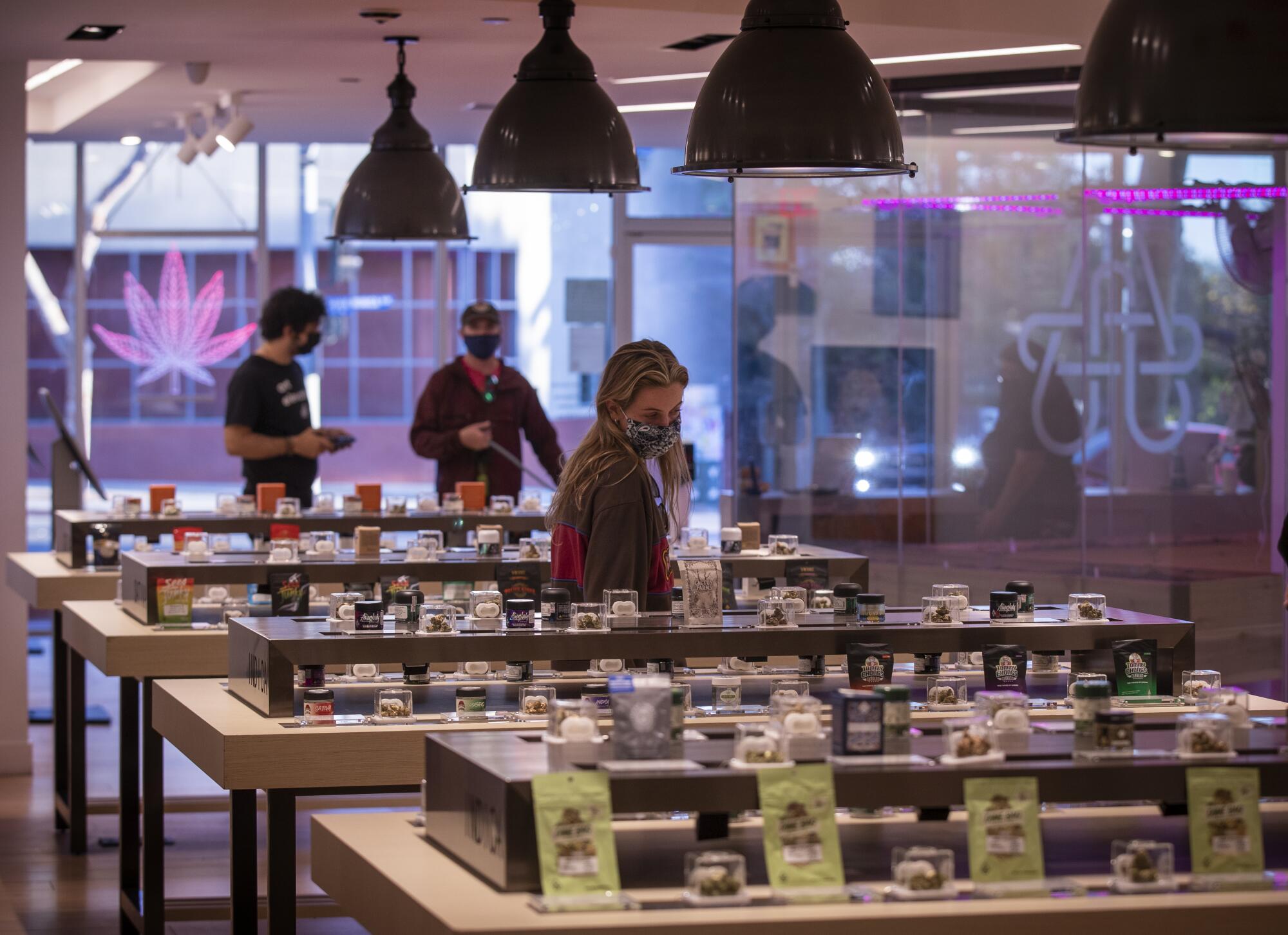
In May, a coalition of some 130 cannabis businesses and advocacy groups wrote an open letter to Newsom, calling on him to “remedy the failures of Prop. 64” and “to not allow the cannabis market that pioneered our nation’s industry to further descend into bankruptcy.”
Newsom responded to the complaints in June by signing legislation that suspends the cultivation tax, but allows the state to increase the excise tax after three years to generate equivalent revenue.
Industry officials say the governor’s actions have not gone far enough, calling for him to also slash the excise tax from 15% to 5%.
Other states, such as Colorado and Washington, have high taxes but have simplified the licensing process and levy lower fees on applicants. Those hoping to improve California’s licensed cannabis system cite the two states, the first to legalize retail sales in 2012, arguing they have done better than California in developing their legal markets.
In California, the initial application fee for a retail license is $1,000, but there are also annual state fees that depend on revenue and can amount to tens of thousands of dollars each year for a moderate-sized business, and up to $96,000 for a large retail operation.
Washington charges a $266 application fee for a retail license and a $1,062 annual renewal fee. Colorado charges about $7,400 in licensing fees, but after that the annual fee is only $1,800.
Proposition 64 also requires operators seeking state licenses to go through a costly and time-consuming process of studying the environmental impacts of their operations and taking steps to reduce harm.
Such costs are a burden for small cannabis operations but can be absorbed more easily by large farms that are backed with money from venture capitalists.
John Casali, 53, said he is struggling to keep his small farm going, given the taxes and fees and the oversupply of cannabis from mega-farms and illegal growers.
“I think about quitting every day,” he said.
Times staff writers Paige St. John and Aida Ylanan contributed to this report.
More to Read
Sign up for Essential California
The most important California stories and recommendations in your inbox every morning.
You may occasionally receive promotional content from the Los Angeles Times.
